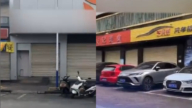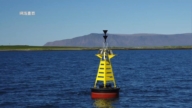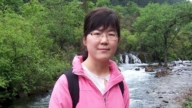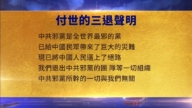【新唐人2011年7月28日訊】中國的高鐵技術是在日本、法國和德國的技術上發展起來的,其中有多少技術是中國本身掌握的呢?一直以來,中國高鐵系統的安全問題就備受關注,「溫州動車追尾事故」更突顯了這個隱憂,中共當局是否為了爭取高鐵發展的世界第一榮譽,不斷在速度上創記錄,而忽略了安全標準?成為外界追求事故主因的焦點。中宣部事後並下令限制報導,更引發民意的撻伐。
據路透社報導,在動車追尾事故發生後第二天,中宣部下達指示,要求媒體以「大災面前有大愛」為主題報導此事。並要求媒體「不質疑,不展開,不聯想」。不要調查事故原因。鐵道部發言人王勇平說,這起事故是由於雷擊造成設備故障導致的。輿論批評當局把老百姓當傻子。
坐在被追尾動車最後一節車廂的乘客金顯眼以及九歲兒子不幸身亡。他的哥哥金先生要求政府給出公正處理。
金先生:「第一個是撞車的總體情況,具體情況還沒有搞清楚。為甚麼會發生這麼大的事故?第二個問題就是賠償問題沒有給我們解決好。 我昨天電視上好像看到了,一個人只有賠17萬左右。那根本是不可能的事情嘛。」
北京學者彭定鼎表示,事故的根本原因是鐵道部極其混亂的管理,也是當局盲目追求世界第一,追求政績工程和虛榮心導致的結果。雷擊絕對無法作為事故發生的理由。
彭定鼎:「現在信息技術這麼發達的年代,一條線上如果有一輛車出故障的話,那麼這條線上難道不應該其他的車立即都得到信號,停止運行嗎?是不是雷電損壞了發動機,就應該出這樣的事情呢?難道在高鐵投入運行的時候,他沒有這種預案嗎?」
北京交通大學運輸經濟管理學院副教授李紅昌表示,發生追尾事故令人費解,前方列車停駛,為何不通知調度室以及後方車輛?即使用最原始的打電話方式也能實現。
李紅昌:「很難以理解。在於說,他本來是可以通過這種方式來解決的。但是為甚麼就沒有解決得好?我們表示很奇怪。停車的人打個電話給調度所。調度所應該通知給後車。除非是管理責任。」
大陸媒體《新京報》引述一位從業20多年的列車司機介紹,所有列車,即使是全部系統失靈,只要在軌道上,調度中心就會擁有列車的運行信息。而列車行車全聽調度指揮。如果兩車的間距低於安全值時,調度計算機也會通過「自動防護系統」發出警告。這位司機認為,如果不是人為破壞或者調度中心系統死機,那麼就是調度失誤或不夠及時造成事故。
當局在事故發生八小時以後就停止搜救,聲稱用儀器探測沒有發現生命跡象。而後對車廂和車頭進行拆卸,並就地挖坑,用泥土掩埋。依照常識,發生追尾的D301次列車的火車頭,應是調查事故原因的重要物證。
彭定鼎:「這種把車頭掩埋起來,夜裡深夜拖走。鐵道部就像是賊。政府都像是賊。」北京官方《經濟觀察網》的評論也質疑,鐵道部清理現場的做法,是否構成了「破壞事故現場」。
北京大學法學院教授賀衛方就溫州鐵路事故發出呼籲,要求全國人大根據憲法第71條規定,組成「特別調查委員會」就此調查。賀衛方說,特別調查是最高權力機關責無旁貸的義務,憲法規定「特別調查委員會」制度已經歷時30年,但全國人大從未啟動。
彭定鼎認為,在中共體制下尋求真相沒有希望。北京律師謝燕益則表示,應該用多元化的渠道尋求真相,包括媒體和公民的角度。
截至25號,中共當局公布的死亡人數為40人。但《上海東方衛視》報導,現場有消息說:死亡數字為63人。而據中國社交網絡《人人網》引述現場志願者「欒天」的日誌:死亡人數初步估計已經超過179人。
新唐人記者秦雪、柏妮採訪報導。
CCP Covers up Cause of Crash
China’s high-speed railway technologies were developed
from Japanese, French and German technologies.
How many independent technologies does China have?
Safety problems have long been a public concern.
It is demonstrated by the Wenzhou train accident.
In pursuit of world honors, Chinese authorities have constantly
pushed for record speeds, even at the cost of safety.
The authorities have become the focus of attention
after the public questioned the cause of the accident.
The Central Department of Propaganda issued restrictions
over the report of the crash.
This incurred more public criticism.
According to Reuters, on the day following the accident,
Central Department of Propaganda ordered the media to focus
only on the theme of “great love in front of the great disaster.”
They required the media “not to question, not to reflect,
not to speculate"- not even to investigate the cause.
Wang Yongping, a spokesman for the Ministry of Railways said
that lightening caused equipment failure,
which in turn caused the accident.
Public criticism says that the authorities
are making a mockery of the people.
Jin Xianyan and his 9-year-old son perished in the crash.
His brother requested the government
to offer compensation to the deceased.
Mr. Jin: The cause of the accident is not clarified.
Why would such a serious accident happen at the first place?
The second issue is about compensation.
I saw on television yesterday that each death
is compensated with only RMB 170,000.
That is simply great injustice!”
Beijing- based scholar Peng Dingding said that the ultimate
cause was the chaotic administration of Ministry of Railways.
It is also a result of authorities’ blind pursuit of world records,
vanity and political performance.
Lightening can never be the true reason for the accident.
Peng Dingding: It is a time of well-developed info technology.
If a train has equipment failure,
how can the other trains on the railway not obtain the info?
Is it a legitimate excuse that lightening damaged the engine?
When the high speed train was put into operation,
didn’t they take into consideration such dangers?”
Li Hongchang, professor at Beijing’s Transportation University,
expressed his confusion about the rear-end accident.
He wondered why the control office did not notify
the other vehicles as soon as the first one had stopped.
He stated that even telephone calls would fulfill that task.
Li Hongchang: It is very difficult to understand.
Why wasn’t the accident prevented
even though there were measures of prevention in place?
We all feel strange about it.
Once the control office learns of the stoppage,
they should notify the vehicles behind.
Otherwise, it would be malfeasance.
Beijing News quoted a train driver with 20 years of experience
saying that the control office should have all trains’ info,
as long as they stay on track, even with complete system failure.
All trains follow the instructions of the control office.
If the distance between two trains reaches an alert level,
the scheduling computer will send out a warning
through the automatic protection system.
The driver said, if it’s not deliberate sabotage or control system
failure, it must have been caused by mis-scheduling.
The authorities stopped rescue, eight hours after the accident,
claiming that there were no more signs of life.
They then demolished the locomotive of D301,
which is the train that rear-ended the first one, and buried it.
It is common sense that the locomotive is
important evidence for an investigation.
Peng: Burying the locomotive and moving it away at night –
the Ministry of Railways is acting like a thief,
just like the entire government.
Comments from Beijing authorities’ official website
Economic Observer Online questioned the Ministry of Railways,
saying that their clearance of the crash site
constitutes the crime of “destruction of an accident site.”
Law School professor He Weifang at Beijing University
called for a special committee of investigation for the accident.
This would be in accordance with article 71 of the constitution.
He said forming a special commission is an obligation
of the highest authorities.
The special commission institution has been established
for 30 years without even one commission being set up.
Peng Dingding said that there is no mechanism to obtain
the truth from the communist regime.
Beijing lawyer Xie Yanyi called for more channels of info,
including media and individual citizens.
The official death toll released on July 25 was 40.
However, according to Shanghai Oriental TV,
news from the accident site reported 63 deaths.
Netizen Letian released on renren.com, China’s Facebook,
that the preliminary figure of deaths had exceeded 179.
NTD reporters Qin Xue and Bo Ni




























